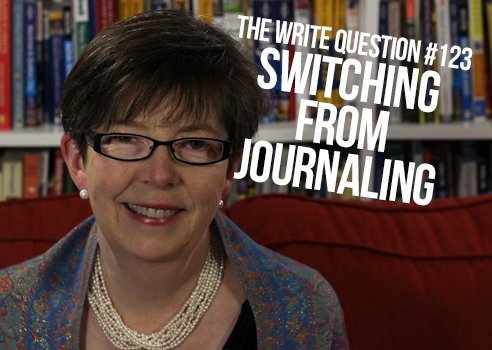Viewing time: 4 mins. 25 secs.
The Write Question is a weekly video podcast about writing that I started in 2017 and that ran, more or less weekly, until April 2022. This is a republication of issue #123, which discusses how to switch from journaling to toher types of writing. The post first ran on Jan. 17/20.
Transcript:
How do you switch from journaling to other types of writing? That’s the topic I’m addressing today in The Write Question. I’m Daphne Gray-Grant, the Publication Coach.
I have a question from Amy Pierre, who’s from Chicago, Illinois. Here’s what she’s asked via email: “I have a really strong journaling habit but I want to write a book. Do you think I need to stop journaling in order to increase my time and motivation?”
Thanks for your question, Amy. You’re raising one of the key puzzles of writing. And it’s this: Why do we find certain types of writing relatively easy? And why are other types so incredibly difficult?
I think the difference has to do with the end purpose of the writing. If we’re journaling, we’re writing for ourselves. We know that no one else is going to see it, probably ever. Or at least until we’re dead. But if we’re writing a book or a dissertation or even an important report for our boss, then many other people are going to read our words. And, on some level we even WANT them to read.
But that wish is a double-edge sword. Because when those people read our work, they’re going to judge us. And judgement is scary. We fear we will not come up to snuff. We fret we will not be anywhere near good enough. And we worry that we’re going to look inept compared to others.
But did you know that every writer, even the famous ones, must begin the same way? You didn’t imagine that perfect words just rolled out of Neil Gaiman’s head, did you? No! Of course not. No one writes perfect words the first time.
Every successful writer, by definition, is a successful self-editor, because that’s where all the work resides. The secret to becoming a better writer is two-fold:
First, put your fears on pause by comforting yourself that no one will be able to read your crappy first draft until you choose to give it to them, AFTER you’ve edited it.
Second, spend more time editing than you do writing.
If you follow these two steps, you’ll be able to write a book with the same facility that you’re able to journal.
Now, let me address another question you may have and this one relates to time. Most of the people who work with me say that their writing is better and easier if they do it in the morning. I find the same thing to be true for me, too, so I’m going to suggest you allocate some morning time to your book.
Some people who journal like to do that writing first thing in the morning. But if you really want to make headway with your book, I’d suggest prioritizing that project. If you have enough time in the morning, you may be able to do BOTH your journaling and your book. But if don’t have enough time, I’d suggest working on your book in the morning and leaving your journaling for the evening.
Ultimately, it’s great news that you already have a journaling habit, Amy. Now you just need to layer a book-writing habit on top of that.
Finally, let me wrap up with a quote from the late American film critic Pauline Kael:
“Where there is a will, there is a way. If there is a chance in a million that you can do something, anything, to keep what you want from ending, do it. Pry the door open or, if need be, wedge your foot in that door and keep it open.”
Amy, writing a book is no more complex than writing in your journal. The hard part will be editing your book. But you will be able to find editing help when you need it. For now, just understand that your main job is going to be managing your fear. To do that, just write, without worrying about quality.
*
If you’d like to learn how to stop procrastinating and make writing a happier, more fulfilling process for yourself, please take a look at my book Your Happy First Draft. I don’t sell it in bookstores or via Amazon. The only place to buy it is on my website, link below.


